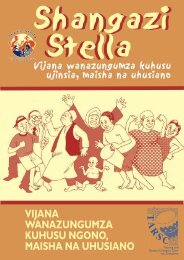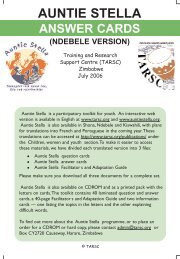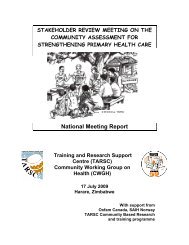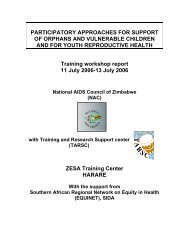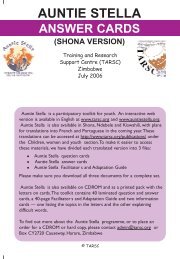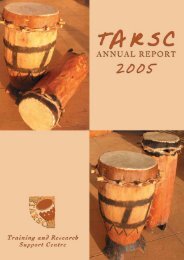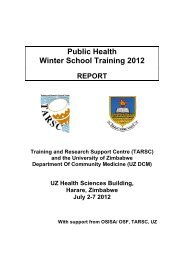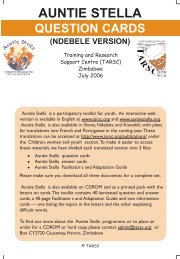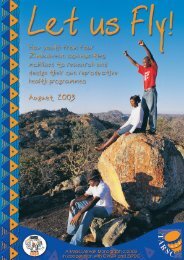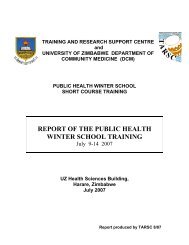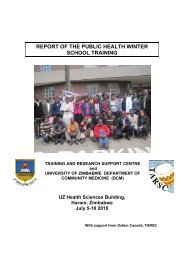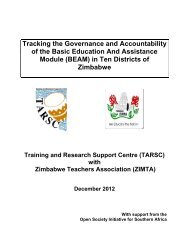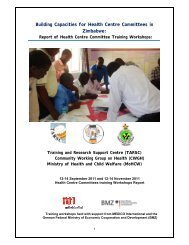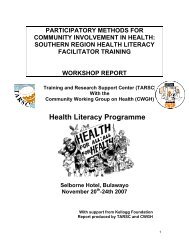HLregional meeting09.pdf - Training and Research Support Centre
HLregional meeting09.pdf - Training and Research Support Centre
HLregional meeting09.pdf - Training and Research Support Centre
Create successful ePaper yourself
Turn your PDF publications into a flip-book with our unique Google optimized e-Paper software.
with local stakeholders on an on-going basis creates the opportunity for distortions or<br />
misunderst<strong>and</strong>ings to be corrected relatively rapidly <strong>and</strong> easily. Relatedly, activities <strong>and</strong><br />
results are more widely accepted if they build on <strong>and</strong> link the ‘best of diverse resource<br />
angles’<br />
• Health Literacy is based on iterative learning <strong>and</strong> feedback loops <strong>and</strong> there is a two-way<br />
sharing of information (local people take a lead role in sharing of experience <strong>and</strong> knowledge,<br />
facilitation, investigation, analysis <strong>and</strong> learning, action <strong>and</strong> reflection), sharing of information<br />
<strong>and</strong> ideas, triangulation, the quality of behavior <strong>and</strong> interaction, rigorous observation <strong>and</strong><br />
reflective judgment <strong>and</strong> action. For this reason it allows for the proper identification of<br />
stakeholders, community structures, <strong>and</strong> provides space for the adequate representation of<br />
stakeholders that provide stability <strong>and</strong> sustainability, recognition <strong>and</strong> acknowledge to<br />
community roles in Primary Health care.<br />
5.6. Lessons learned about people centered health systems<br />
• They invest in people as the primary beneficiaries <strong>and</strong> participants of the Health system.<br />
This promotes use of locally available resources to advance health through increased<br />
knowledge on prevention, effective <strong>and</strong> practical prevention strategies.<br />
• People centered health systems can be achieved through huge investments at primary care<br />
level thus the need to revitalize Primary health care through Health Literacy. Investment in<br />
Primary health care ultimately reduces the total cost for health (reduced disease burden,<br />
lees people needing curative services)<br />
• People Centered Health systems are founded on a turf layer of trust. Health Literacy builds<br />
trust, <strong>and</strong> promotes two-way communication between communities <strong>and</strong> other actors in the<br />
Health system. Accordingly access to <strong>and</strong> uptake of health services is significantly<br />
increased.<br />
5.7. Lessons learned about social empowerment in health<br />
• Health Literacy is an efficient social empowerment process. It is encouraging to note that the<br />
values <strong>and</strong> ideas of social empowerment are synonymous with the Health Literacy process.<br />
Social empowerment processes should be people initiated, people driven, people led,<br />
dynamic, sustainable, robust, flexible <strong>and</strong> adaptive, so is Health Literacy.<br />
• Constitutional entitlements, health laws, community structures, health freedoms <strong>and</strong> health<br />
rights that enable people to organize power to control their own resources should support<br />
social empowerment processes.<br />
• Social empowerment processes are sustained by fundamentals of social justice, equity,<br />
accountability, <strong>and</strong> participation <strong>and</strong> good governance<br />
6. Taking the Health Literacy programme forward<br />
This session was aimed at assessing capacities <strong>and</strong> skills for health literacy in new country partners.<br />
The session observed opportunities for Health Literacy in Kenya, Zambia, Mozambique, Tanzania<br />
<strong>and</strong> Ug<strong>and</strong>a. The session further explored the roles, capacities <strong>and</strong> actions for the country lead<br />
organizations as well as the regional support / actions that should be included in the next phase of<br />
Health Literacy work in East <strong>and</strong> Southern Africa linking to the wider health work.<br />
Overall, the new country partners had varying suggestions on the way the Health Literacy<br />
programme would be implemented. While there were areas of commonality, there were also areas of<br />
difference. Mr. Martin Mkuye from AMREF Tanzania noted that Health Literacy would easily be<br />
integrated in programming areas of AMREF in all the 21 mainl<strong>and</strong> regions of Tanzania. The<br />
programme would also engage with already existing alliances in local government authorities at<br />
regional <strong>and</strong> district levels, over70 as sub-grantees in Civil Society organisations, development<br />
partners <strong>and</strong> the private sector where Health Literacy facilitators will be drawn from. He added that<br />
the programme would enhance the organisational capacity building while also benefiting <strong>and</strong> upscaling<br />
the skills <strong>and</strong> capacities of health care workers such as Community Health Care workers,<br />
enrolled nurses, clinical officers that AMREF is already working with. He added that Health Literacy<br />
facilitators would also come from this resource pool in government to compliment <strong>and</strong> support<br />
government efforts in Primary Health care. Mr. Mkuye noted that Health Literacy would create<br />
community movements <strong>and</strong> organisations that will ensure that communities are an integral part of a<br />
responsive health system, <strong>and</strong> harness community resources in Tanzania. Consequently, the<br />
programme would strengthen health systems research for policy <strong>and</strong> practice, <strong>and</strong> influence<br />
programming into people led participatory social empowerment processes<br />
25



